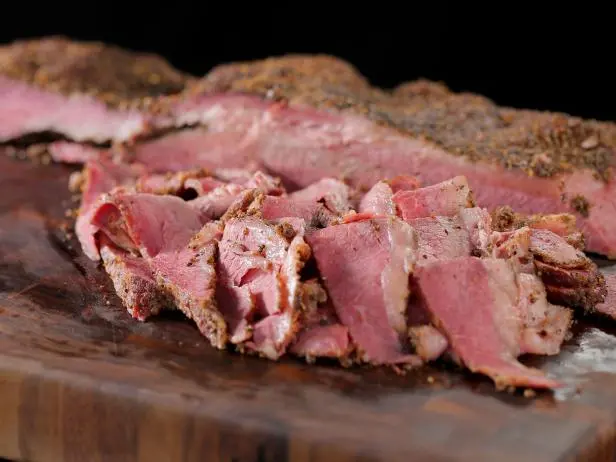mushroomboots
Fire Starter
- Oct 4, 2018
- 53
- 15
I can share this recipe regarding juniper berries, and a real twist on pastrami with two sweet glazes. This recipe comes by way of a guest contributor to my online pastrami write-up:
Pre-soak the brisket(s) for 48 hours in cool water (iced to maintain the temperature below 40°, or kept in the refrigerator in a bucket or zipper bag). Add some roughly cubed, raw potatoes to the water, (appox 2 pounds) to help soak up some of the salts that are drawn out of the brisket. Change the water, and potatoes, every 12 hours. Some of the water from the last soak may be saved and used for boiling cabbage.
At the end of the soaking time discard the potatoes, remove the brisket, and let dry. Then apply the following rub, reserving some for another coating before slicing. Wrap brisket in plastic, then refrigerate overnight.
RUB:
4 parts ground peppercorns
4 parts ground coriander seeds
2 parts Turbinado sugar
2 parts ground Juniper berries
1 part ground onion powder
1 part thyme, ground
1 part paprika
1 part ground garlic powder
1 part ground ginger
1/2 part ground cloves
1/2 part ground nutmeg
On cooking day bring brisket to room temperature, then cook with an indirect set up at 275° (grate temperature) until the internal temperature is 180°. Allow about 1 hour per pound for cooking.
During the last 1/2 hour of the cook, glaze the brisket with one of these two concoctions, then rest about 1/2 hour, re-apply rub liberally, then slice against the grain and serve. This is Heaven.
Glaze # 1
1 cup honey
1 cup maple syrup
1/2 tablespoon cinnamon
1/4 cup confectioner’s sugar
Heat liquids gently, over low heat, until warm to touch. Then add cinnamon, and slowly mix in confectioner’s sugar until thoroughly mixed. Take off heat, set aside until needed, Use to glaze meat while on cooker. Reserve some glaze to serve on the side at the table.
Glaze # 2
1-16 oz package fresh cranberries
1 cup sugar, (Turbinado sugar is a nice touch)
1 jar, approximately, 10 oz. of Red Currant Jam
1- 8 oz container of Honey Mustard
Put cranberries in a 3-4 Qt pot on low, and add sugar... stir occasionally, cook until cranberries start to "pop". Add Red Currant Jam, and Honey Mustard and let simmer for approximately 10 minutes, stirring a few times during the process. Take off heat, set aside until needed use to glaze meat while on cooker. Reserve some glaze to serve on the side at the table.
Cooks Notes:
I'm of an Irish, "off the boat” heritage, and have been tweaking this recipe since the mid 70's. Only in the last 4 years have I hit what I call "Corn Beef Nirvana".
Bobberqer
So, it appears people buy a brisket and are soaking it to Remove salt. As I had mentioned, I'd wanted to make this pastrami from a cut of venison. I apologize for my complete inexperience, but I sure would appreciate a basic recommendation on just how to brine my venison before applying the rub. Thanks for the patience you guys.






